The Role of Artificial Intelligence in Modern Healthcare Systems
VerifiedAdded on 2023/01/11
|5
|1112
|100
Report
AI Summary
This report examines the transformative potential of artificial intelligence (AI) in the healthcare sector. It highlights how AI can improve medical diagnostics by enabling faster and more accurate disease identification through advanced algorithms and data analysis, potentially reducing misdiagnosis. The report also explores AI's role in supporting clinical decisions by providing physicians with predictive analytics and access to vast amounts of medical research, enabling more informed and effective patient care. Furthermore, it discusses AI's application in healthcare management, including cost reduction, improved efficiency, and better patient outcomes through optimized resource allocation and the identification of unnecessary treatments. The report concludes that AI is poised to significantly enhance healthcare accessibility, quality, and overall outcomes, signifying a crucial shift in the industry.
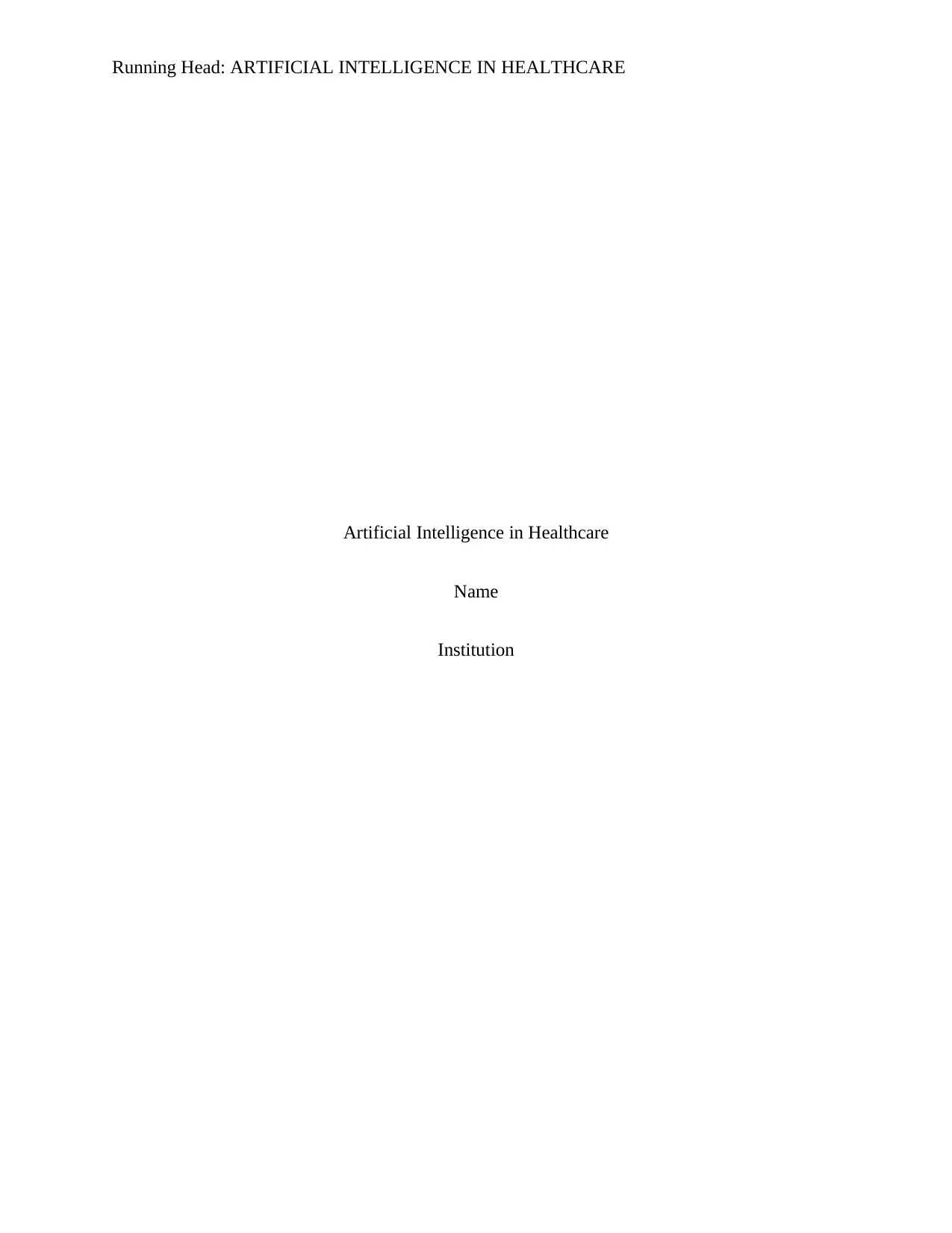
Running Head: ARTIFICIAL INTELLIGENCE IN HEALTHCARE
Artificial Intelligence in Healthcare
Name
Institution
Artificial Intelligence in Healthcare
Name
Institution
Paraphrase This Document
Need a fresh take? Get an instant paraphrase of this document with our AI Paraphraser
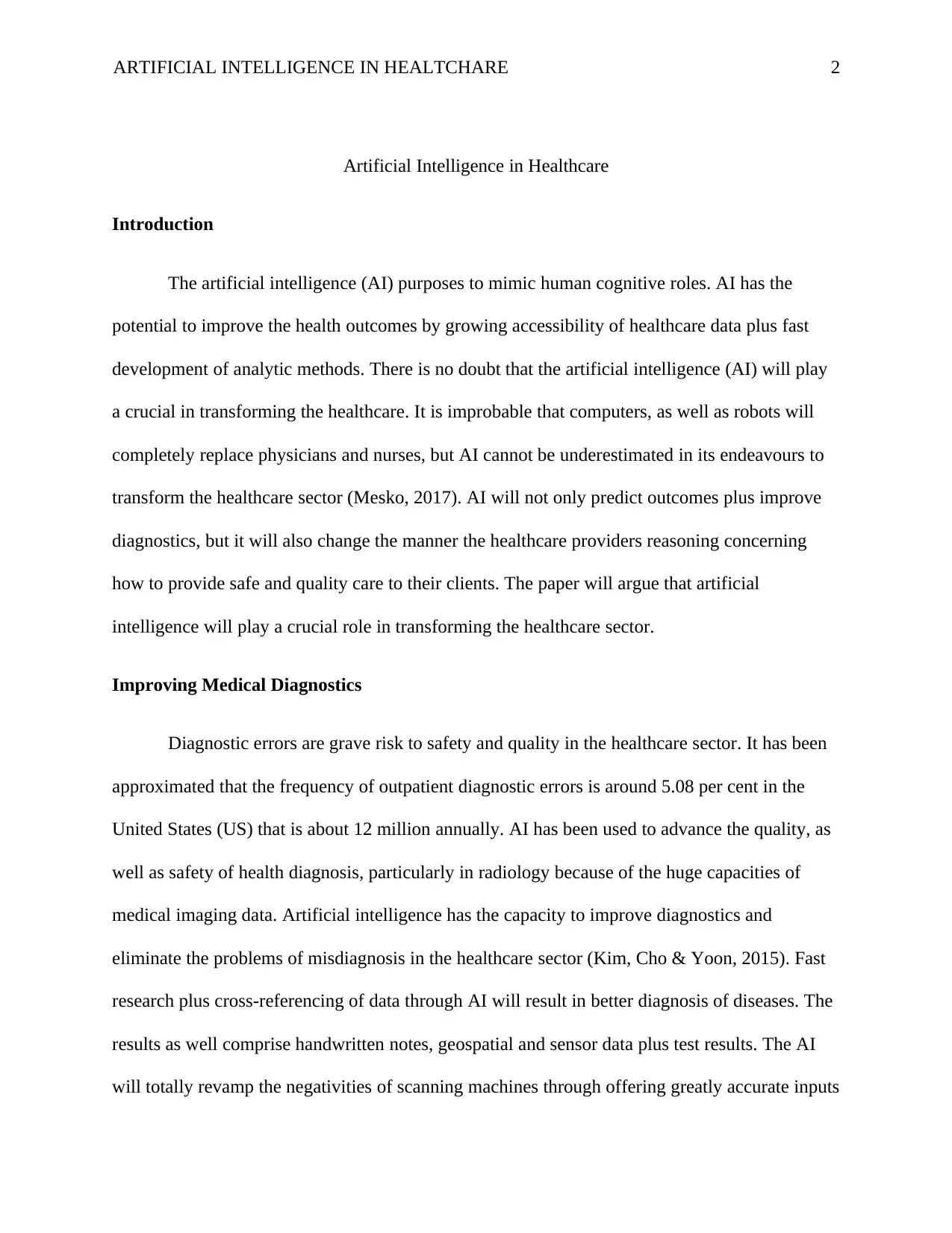
ARTIFICIAL INTELLIGENCE IN HEALTCHARE 2
Artificial Intelligence in Healthcare
Introduction
The artificial intelligence (AI) purposes to mimic human cognitive roles. AI has the
potential to improve the health outcomes by growing accessibility of healthcare data plus fast
development of analytic methods. There is no doubt that the artificial intelligence (AI) will play
a crucial in transforming the healthcare. It is improbable that computers, as well as robots will
completely replace physicians and nurses, but AI cannot be underestimated in its endeavours to
transform the healthcare sector (Mesko, 2017). AI will not only predict outcomes plus improve
diagnostics, but it will also change the manner the healthcare providers reasoning concerning
how to provide safe and quality care to their clients. The paper will argue that artificial
intelligence will play a crucial role in transforming the healthcare sector.
Improving Medical Diagnostics
Diagnostic errors are grave risk to safety and quality in the healthcare sector. It has been
approximated that the frequency of outpatient diagnostic errors is around 5.08 per cent in the
United States (US) that is about 12 million annually. AI has been used to advance the quality, as
well as safety of health diagnosis, particularly in radiology because of the huge capacities of
medical imaging data. Artificial intelligence has the capacity to improve diagnostics and
eliminate the problems of misdiagnosis in the healthcare sector (Kim, Cho & Yoon, 2015). Fast
research plus cross-referencing of data through AI will result in better diagnosis of diseases. The
results as well comprise handwritten notes, geospatial and sensor data plus test results. The AI
will totally revamp the negativities of scanning machines through offering greatly accurate inputs
Artificial Intelligence in Healthcare
Introduction
The artificial intelligence (AI) purposes to mimic human cognitive roles. AI has the
potential to improve the health outcomes by growing accessibility of healthcare data plus fast
development of analytic methods. There is no doubt that the artificial intelligence (AI) will play
a crucial in transforming the healthcare. It is improbable that computers, as well as robots will
completely replace physicians and nurses, but AI cannot be underestimated in its endeavours to
transform the healthcare sector (Mesko, 2017). AI will not only predict outcomes plus improve
diagnostics, but it will also change the manner the healthcare providers reasoning concerning
how to provide safe and quality care to their clients. The paper will argue that artificial
intelligence will play a crucial role in transforming the healthcare sector.
Improving Medical Diagnostics
Diagnostic errors are grave risk to safety and quality in the healthcare sector. It has been
approximated that the frequency of outpatient diagnostic errors is around 5.08 per cent in the
United States (US) that is about 12 million annually. AI has been used to advance the quality, as
well as safety of health diagnosis, particularly in radiology because of the huge capacities of
medical imaging data. Artificial intelligence has the capacity to improve diagnostics and
eliminate the problems of misdiagnosis in the healthcare sector (Kim, Cho & Yoon, 2015). Fast
research plus cross-referencing of data through AI will result in better diagnosis of diseases. The
results as well comprise handwritten notes, geospatial and sensor data plus test results. The AI
will totally revamp the negativities of scanning machines through offering greatly accurate inputs
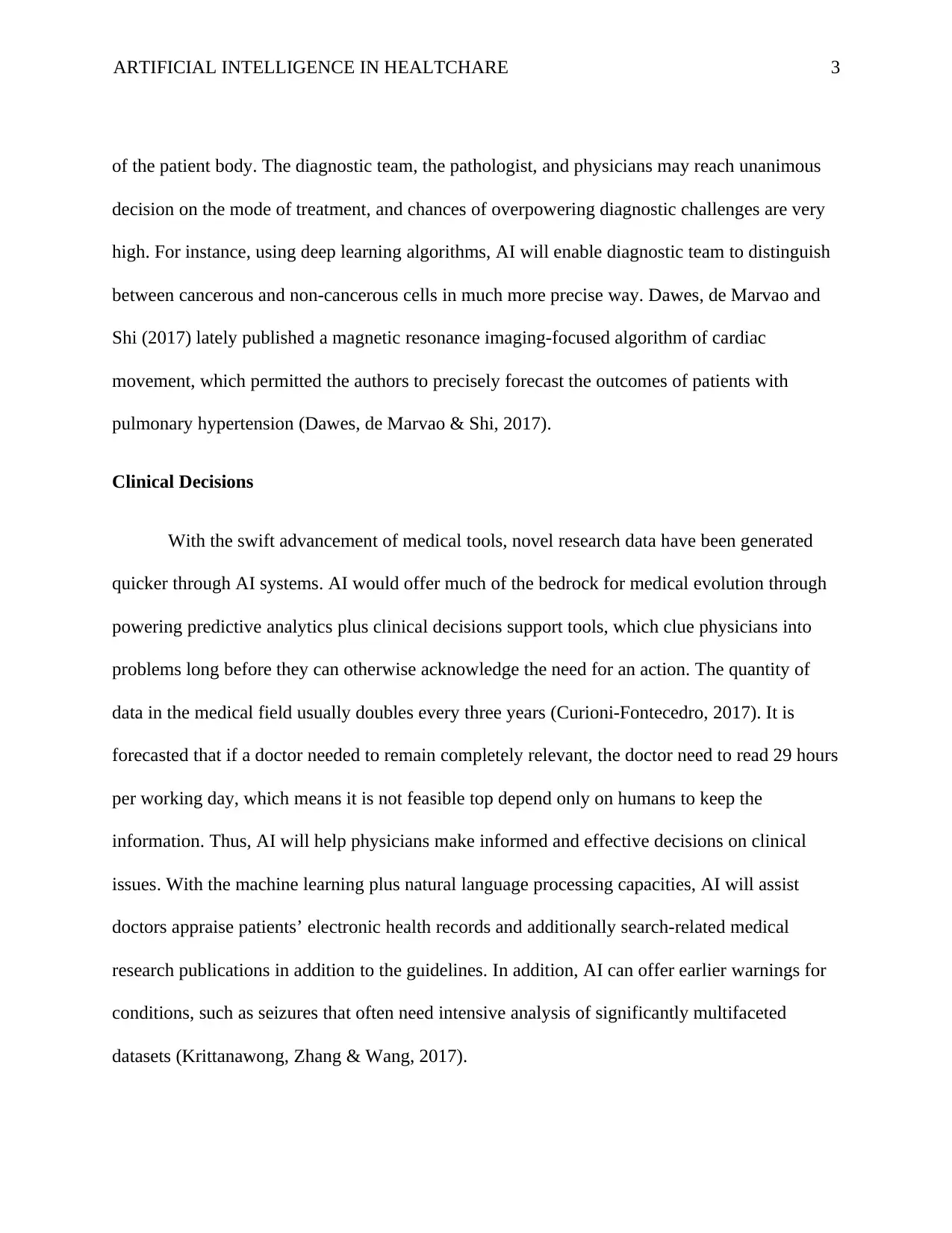
ARTIFICIAL INTELLIGENCE IN HEALTCHARE 3
of the patient body. The diagnostic team, the pathologist, and physicians may reach unanimous
decision on the mode of treatment, and chances of overpowering diagnostic challenges are very
high. For instance, using deep learning algorithms, AI will enable diagnostic team to distinguish
between cancerous and non-cancerous cells in much more precise way. Dawes, de Marvao and
Shi (2017) lately published a magnetic resonance imaging-focused algorithm of cardiac
movement, which permitted the authors to precisely forecast the outcomes of patients with
pulmonary hypertension (Dawes, de Marvao & Shi, 2017).
Clinical Decisions
With the swift advancement of medical tools, novel research data have been generated
quicker through AI systems. AI would offer much of the bedrock for medical evolution through
powering predictive analytics plus clinical decisions support tools, which clue physicians into
problems long before they can otherwise acknowledge the need for an action. The quantity of
data in the medical field usually doubles every three years (Curioni-Fontecedro, 2017). It is
forecasted that if a doctor needed to remain completely relevant, the doctor need to read 29 hours
per working day, which means it is not feasible top depend only on humans to keep the
information. Thus, AI will help physicians make informed and effective decisions on clinical
issues. With the machine learning plus natural language processing capacities, AI will assist
doctors appraise patients’ electronic health records and additionally search-related medical
research publications in addition to the guidelines. In addition, AI can offer earlier warnings for
conditions, such as seizures that often need intensive analysis of significantly multifaceted
datasets (Krittanawong, Zhang & Wang, 2017).
of the patient body. The diagnostic team, the pathologist, and physicians may reach unanimous
decision on the mode of treatment, and chances of overpowering diagnostic challenges are very
high. For instance, using deep learning algorithms, AI will enable diagnostic team to distinguish
between cancerous and non-cancerous cells in much more precise way. Dawes, de Marvao and
Shi (2017) lately published a magnetic resonance imaging-focused algorithm of cardiac
movement, which permitted the authors to precisely forecast the outcomes of patients with
pulmonary hypertension (Dawes, de Marvao & Shi, 2017).
Clinical Decisions
With the swift advancement of medical tools, novel research data have been generated
quicker through AI systems. AI would offer much of the bedrock for medical evolution through
powering predictive analytics plus clinical decisions support tools, which clue physicians into
problems long before they can otherwise acknowledge the need for an action. The quantity of
data in the medical field usually doubles every three years (Curioni-Fontecedro, 2017). It is
forecasted that if a doctor needed to remain completely relevant, the doctor need to read 29 hours
per working day, which means it is not feasible top depend only on humans to keep the
information. Thus, AI will help physicians make informed and effective decisions on clinical
issues. With the machine learning plus natural language processing capacities, AI will assist
doctors appraise patients’ electronic health records and additionally search-related medical
research publications in addition to the guidelines. In addition, AI can offer earlier warnings for
conditions, such as seizures that often need intensive analysis of significantly multifaceted
datasets (Krittanawong, Zhang & Wang, 2017).
⊘ This is a preview!⊘
Do you want full access?
Subscribe today to unlock all pages.

Trusted by 1+ million students worldwide
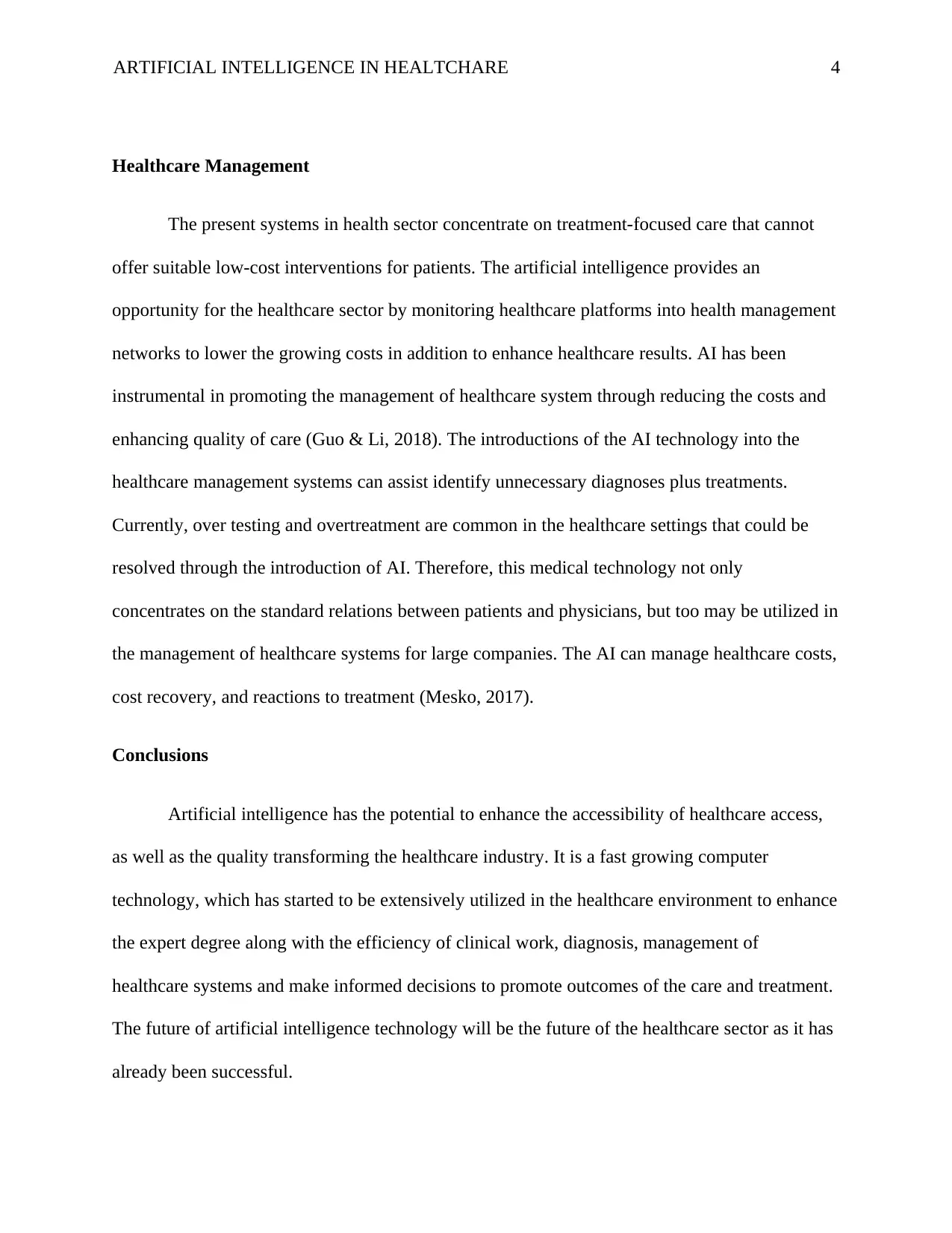
ARTIFICIAL INTELLIGENCE IN HEALTCHARE 4
Healthcare Management
The present systems in health sector concentrate on treatment-focused care that cannot
offer suitable low-cost interventions for patients. The artificial intelligence provides an
opportunity for the healthcare sector by monitoring healthcare platforms into health management
networks to lower the growing costs in addition to enhance healthcare results. AI has been
instrumental in promoting the management of healthcare system through reducing the costs and
enhancing quality of care (Guo & Li, 2018). The introductions of the AI technology into the
healthcare management systems can assist identify unnecessary diagnoses plus treatments.
Currently, over testing and overtreatment are common in the healthcare settings that could be
resolved through the introduction of AI. Therefore, this medical technology not only
concentrates on the standard relations between patients and physicians, but too may be utilized in
the management of healthcare systems for large companies. The AI can manage healthcare costs,
cost recovery, and reactions to treatment (Mesko, 2017).
Conclusions
Artificial intelligence has the potential to enhance the accessibility of healthcare access,
as well as the quality transforming the healthcare industry. It is a fast growing computer
technology, which has started to be extensively utilized in the healthcare environment to enhance
the expert degree along with the efficiency of clinical work, diagnosis, management of
healthcare systems and make informed decisions to promote outcomes of the care and treatment.
The future of artificial intelligence technology will be the future of the healthcare sector as it has
already been successful.
Healthcare Management
The present systems in health sector concentrate on treatment-focused care that cannot
offer suitable low-cost interventions for patients. The artificial intelligence provides an
opportunity for the healthcare sector by monitoring healthcare platforms into health management
networks to lower the growing costs in addition to enhance healthcare results. AI has been
instrumental in promoting the management of healthcare system through reducing the costs and
enhancing quality of care (Guo & Li, 2018). The introductions of the AI technology into the
healthcare management systems can assist identify unnecessary diagnoses plus treatments.
Currently, over testing and overtreatment are common in the healthcare settings that could be
resolved through the introduction of AI. Therefore, this medical technology not only
concentrates on the standard relations between patients and physicians, but too may be utilized in
the management of healthcare systems for large companies. The AI can manage healthcare costs,
cost recovery, and reactions to treatment (Mesko, 2017).
Conclusions
Artificial intelligence has the potential to enhance the accessibility of healthcare access,
as well as the quality transforming the healthcare industry. It is a fast growing computer
technology, which has started to be extensively utilized in the healthcare environment to enhance
the expert degree along with the efficiency of clinical work, diagnosis, management of
healthcare systems and make informed decisions to promote outcomes of the care and treatment.
The future of artificial intelligence technology will be the future of the healthcare sector as it has
already been successful.
Paraphrase This Document
Need a fresh take? Get an instant paraphrase of this document with our AI Paraphraser
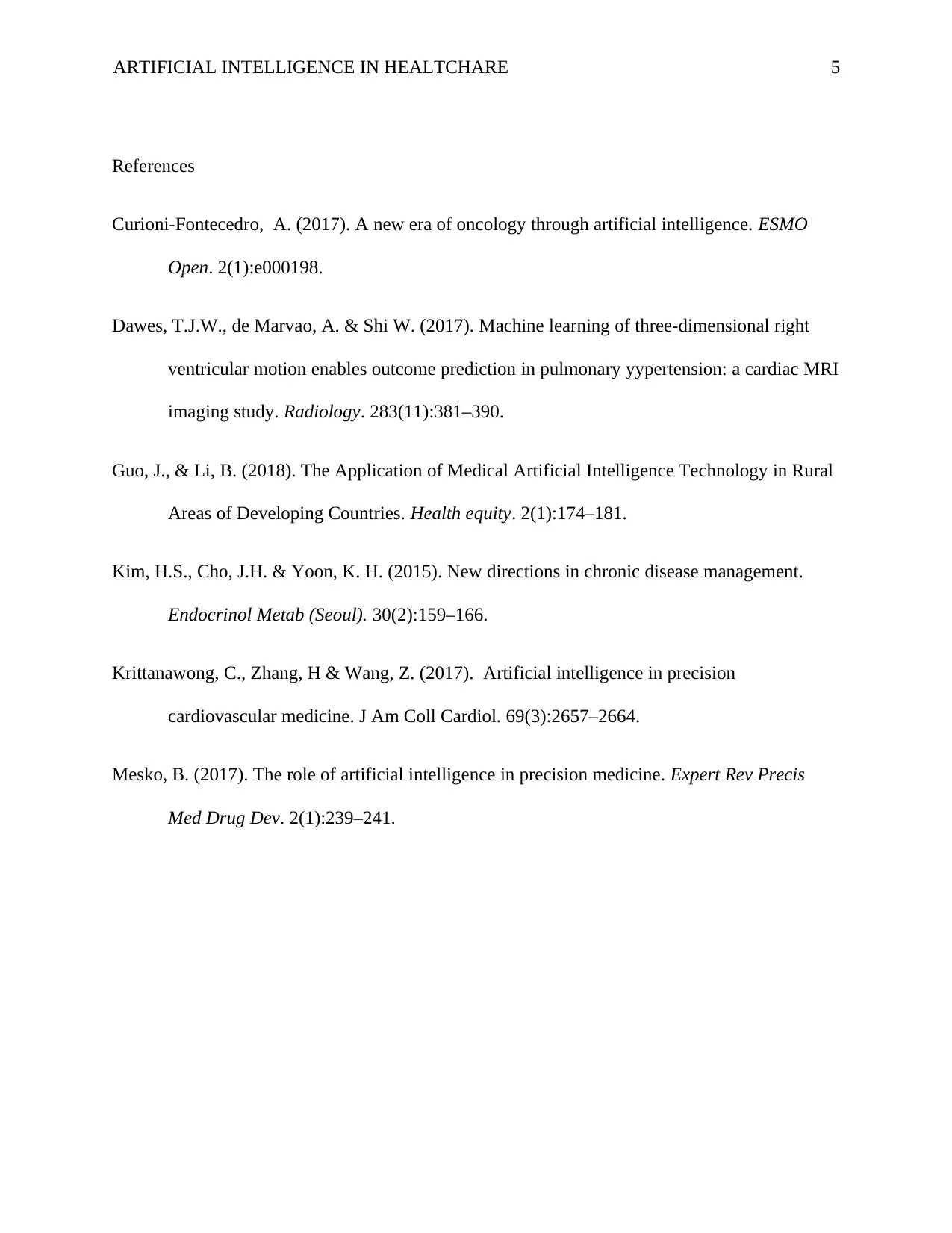
ARTIFICIAL INTELLIGENCE IN HEALTCHARE 5
References
Curioni-Fontecedro, A. (2017). A new era of oncology through artificial intelligence. ESMO
Open. 2(1):e000198.
Dawes, T.J.W., de Marvao, A. & Shi W. (2017). Machine learning of three-dimensional right
ventricular motion enables outcome prediction in pulmonary yypertension: a cardiac MRI
imaging study. Radiology. 283(11):381–390.
Guo, J., & Li, B. (2018). The Application of Medical Artificial Intelligence Technology in Rural
Areas of Developing Countries. Health equity. 2(1):174–181.
Kim, H.S., Cho, J.H. & Yoon, K. H. (2015). New directions in chronic disease management.
Endocrinol Metab (Seoul). 30(2):159–166.
Krittanawong, C., Zhang, H & Wang, Z. (2017). Artificial intelligence in precision
cardiovascular medicine. J Am Coll Cardiol. 69(3):2657–2664.
Mesko, B. (2017). The role of artificial intelligence in precision medicine. Expert Rev Precis
Med Drug Dev. 2(1):239–241.
References
Curioni-Fontecedro, A. (2017). A new era of oncology through artificial intelligence. ESMO
Open. 2(1):e000198.
Dawes, T.J.W., de Marvao, A. & Shi W. (2017). Machine learning of three-dimensional right
ventricular motion enables outcome prediction in pulmonary yypertension: a cardiac MRI
imaging study. Radiology. 283(11):381–390.
Guo, J., & Li, B. (2018). The Application of Medical Artificial Intelligence Technology in Rural
Areas of Developing Countries. Health equity. 2(1):174–181.
Kim, H.S., Cho, J.H. & Yoon, K. H. (2015). New directions in chronic disease management.
Endocrinol Metab (Seoul). 30(2):159–166.
Krittanawong, C., Zhang, H & Wang, Z. (2017). Artificial intelligence in precision
cardiovascular medicine. J Am Coll Cardiol. 69(3):2657–2664.
Mesko, B. (2017). The role of artificial intelligence in precision medicine. Expert Rev Precis
Med Drug Dev. 2(1):239–241.
1 out of 5
Related Documents
Your All-in-One AI-Powered Toolkit for Academic Success.
+13062052269
info@desklib.com
Available 24*7 on WhatsApp / Email
![[object Object]](/_next/static/media/star-bottom.7253800d.svg)
Unlock your academic potential
Copyright © 2020–2026 A2Z Services. All Rights Reserved. Developed and managed by ZUCOL.




